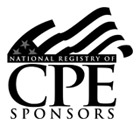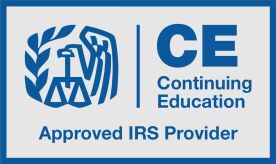

View Details/Register
View Details/Register
View Details/Register
View Details/Register
View Details/Register
View Details/Register
View Details/Register
View Details/Register
View Details/Register
View Details/Register



CPA - small firm
CPA - medium firm
CPA - large firm
Enrolled Agent
This course will provide a comprehensive understanding of estate tax planning and how it can impact an individual's or family's financial situation. The fundamental concepts of estate taxation will be covered, including the current state of federal and state estate tax laws and how to minimize estate tax liability. Throughout the course, participants will learn how to evaluate various estate planning strategies—including gifting, trusts, and life insurance—and will assess the advantages and disadvantages of each strategy. Participants will also explore the role of estate planning professionals, including attorneys, accountants, and financial planners, in developing and implementing an effective estate tax plan.
The course will cover the key considerations for evaluating estate tax planning, including the impact of state and federal tax laws, the size and complexity of the estate, and the personal goals and objectives of the individual or family. Participants will also learn how to develop and implement an effective estate tax plan that meets the unique needs and circumstances of each client. By the end of this course, participants will have a solid understanding of the fundamental concepts of estate tax planning and the various strategies available to minimize estate tax liability. They will leave equipped with the knowledge and skills necessary to evaluate and develop an effective estate tax plan that meets the needs and objectives of their clients.
Learning Objectives:
- Define the key terms and concepts related to estate tax planning, including estate tax laws, exemptions, and tax planning strategies
- Determine the impact of federal and state estate tax laws on an individual's or family's financial situation
- Evaluate various estate tax planning strategies—including gifting, trusts, and life insurance—and assess the advantages and disadvantages of each strategy
- Identify the key considerations for evaluating estate tax planning, including the size and complexity of the estate, personal goals and objectives, and the impact of state and federal tax laws
- Construct and implement an effective estate tax plan that meets the unique needs and circumstances of a given client
- Describe how to collaborate effectively with estate planning professionals, including attorneys, accountants, and financial planners, to develop and implement an effective estate tax plan
- Determine how to communicate effectively with clients and other stakeholders about the benefits, risks, and limitations of various estate tax planning strategies and then make recommendations based on each client’s specific needs and goals
- Summarize current changes to estate tax laws and regulations and apply this knowledge to develop effective estate tax plans for clients

Alan Gassman
Gassman, Crotty & Denicolo, P.A.
President
agassman@gassmanpa.com
(727) 442-1200
Alan S. Gassman, J.D., LL.M., is a board-certified estate planning and trust lawyer who practices in Clearwater, Florida. He has an LL.M. in taxation from the University of Florida and practices in trust and estate planning, tax, wealth preservation, and the representation of physicians and medical practices.
Mr. Gassman speaks at many tax conferences, national programs, and webinar platforms, including Bloomberg BNA Tax and Accounting and the Notre Dame Tax and Estate Planning Institute.
- To receive CPE credit, you must register for the webinar before it starts.
- CPE is available to all eligible participants within 24 hours of each webinar.
- To receive CPE for multiple attendees, at least one person must sign up for the webinar. The post-webinar email contains a link to instructions for the proctor letter. Alternatively, you may log in to your account following the webinar and click on the MY ACCOUNT button to find a link to instructions. For paid courses, payment needs to be made for each attendee before credit will be issued.

NASBA Approved
CPAacademy.org (Sponsor Id#: 111889) is registered with the National Association of State Boards of Accountancy (NASBA) as a sponsor of continuing professional education on the National Registry of CPE Sponsors. State boards of accountancy have final authority on the acceptance of individual courses for CPE credit. Complaints regarding registered sponsors may be submitted to the National Registry of CPE Sponsors through its website: www.nasbaregistry.org.
CPAacademy.org 1685 S. Colorado Blvd, Suite #205, Denver, CO 80222

EA Approved
CPAacademy.org (Sponsor Id#: HURS9) has entered into an agreement with the Internal Revenue Service, to meet the requirements of 31 Code of Federal Regulations, section 10.6(g), covering maintenance of attendance records, retention of program outlines, qualifications of instructors, and length of class hours. This agreement does not constitute an endorsement by the IRS as to the quality of the program or its contribution to the professional competence of the enrolled individual. Credit earned by attendees with a PTIN will be reported directly to the IRS as required of all providers. To ensure your CPE hours are reported, update your profile in My Account to include your PTIN number. Please note: IRS CE is only mandatory for EAs and ERPAs. For all other tax return preparers, CE is voluntary.
CPAacademy.org 1685 S. Colorado Blvd, Suite #205, Denver, CO 80222
Our firm was formed in 1987 with one lawyer and a shared secretary and receptionist to provide representation to professionals, business owners and retirees in their estate and related tax and personal planning, business and corporate needs.
Since then we have grown to 6 lawyers and over 20 staff, which we have found over the past two decades to be the best size for us. We are very proud of our team, our systems, and our dedication to providing the best and most appropriate legal services for all clients, whether big or small. Our lawyers meet together almost every morning to discuss and work together on cases, strategies and practice improvement projects in order to work the most efficiently and effectively for our clients. We like what we do and enjoy working together.




